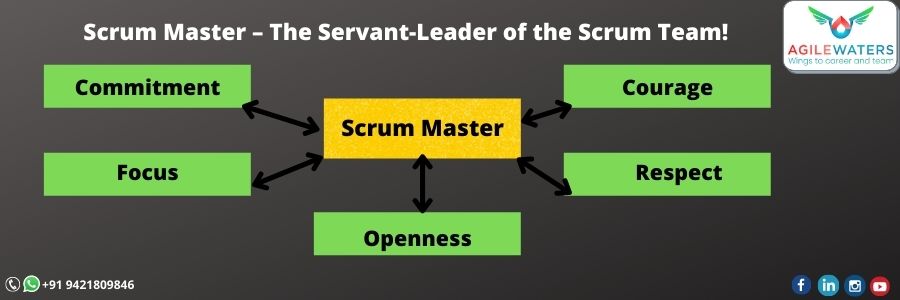
Scrum Master and servant-leader are interchangeable terms. But what exactly does it imply? Is a servant leader in Agile projects, but servant leadership extends far beyond Agile, and Scrum Masters serve more than just the team.
In this blog, we’ll look at the Scrum Master’s role as a servant leader, what that role implies, and what the its obligations are outside of the team, in the context of the organisation.
What does it mean to lead as a servant?
Robert Greenleaf invented the phrase servant leadership in his work “The Servant as Leader,” in which he characterized a servant leader as:
The Servant-Leader is first and foremost a servant. It all begins with a natural desire to help, to be the first to help. After that, one can seek to be a leader by making a conscious decision. That leader differs considerably from one who is first and foremost a leader, which could be due to a desire to gain power, material belonging, control, and authority within the company.
Traditional leadership, which positions the leader at the top of the hierarchy and the employees at the bottom, is fundamentally different from servant leadership. Servant leadership is the polar opposite of traditional leadership in that it positions the leader at the bottom of the hierarchy and employees at the top. In this situation, the leaders are serving the people above them.
Servant leadership refers to leaders who think that rather than acquiring power for themselves, they should serve others and the community in which they live. This leadership style focuses on assisting subordinates in improving themselves, empowering employees, and assisting others in performing to their full potential.
Servant leadership does not dictate what employees should do; rather, it assists individuals in reclaiming their feeling of ownership and realising their full potential in order to achieve their objectives. Servant leadership is all about empowering others, which can boost morale, increase productivity, and reduce employee turnover when done regularly.
Scrum and Servant Leadership
Scrum is, in some ways, the epitome of servant leadership. It does not use a top-down, hierarchical approach like typical project management approaches. Instead, choices are made on the fly and with the participation of the entire team. Scrum is an excellent method for putting servant leadership into practice.
The five Scrum values of Openness, Respect, Commitment, Courage, and Focus align with the Servant Leadership philosophy. The Scrum Master is an important part of the product, team, and organization’s development.
The Scrum Values that a Scrum Master embodies have an impact across the organisation. It is regarded as an evangelist for Scrum adoption and promotion in the workplace.
Servant leadership and the Agile Manifesto
One must value:
Individuals and interactions are more important than processes and instruments.
Working software trumps thorough documentation.
Adapting to change and sticking to a plan
These, too, are consistent with servant leadership beliefs, which emphasise putting people or employees first.
Focusing on constructing projects around motivated individuals and providing them with an environment of support, trust, and collaboration—all qualities of servant leadership—is described in the Agile Manifesto.
Who Are These Servant Leaders, and What Role Do They Play in Society?
Scrum Master service is defined as servant leadership by the Scrum Guide. It serves the development team, the product owner, and the entire organisation with selfless servant leadership. It can build a high-performing team, a valuable product, and an efficient organisation that can accomplish business goals while keeping customers pleased by serving these entities.
Though the term Scrum Master may be misleading, the Scrum Master is not a team leader; rather, he or she assists the team to maintain its smooth operation and productivity.
Servant leadership: A Scrum Master’s day-to-day activities include servant leadership. In a scrum team, servant leadership entails performance planning, coaching, assisting the team in self-organization, resolving disagreements through conflict management, removing roadblocks to development, and serving the team.
While exercising servant leadership, the Scrum Master assists the team in maturing and becoming self-sufficient enough to make their own judgments. In Scrum, servant leadership is all about making the team self-sufficient so they can handle the pressures of the job.
The Scrum Master, as a servant leader, builds a high-performing team by assisting them in becoming collaborative and high-performing in order to achieve goals and meet client expectations.
The Scrum Master’s primary job as a servant leader is to assist the development team in achieving their goals. They assist the team in performing to their full potential by providing a suitable working atmosphere, motivating, leading, and removing impediments that may obstruct growth. The Agile Master will serve as a mentor to the team, guiding them through scrum processes and assisting them in adhering to Agile values while developing the product.
The Scrum Master is in charge of the scrum team’s productivity, and they work diligently to keep the team motivated, inspired, creative, and innovative. Through servant leadership, the Scrum Master assists the team in improving Scrum methods, allowing them to become more productive and generate value.
In the daily stand-up meetings that are scheduled as part of the sprint, the Scrum Team’s involvement in inspiring and assisting the team is evident. It encourages team members to voice their concerns and discuss the sprint’s progress. Team members can discuss roadblocks to their work, and the Scrum master will take appropriate action to ensure that these roadblocks are removed.
The Scrum Master, according to the Scrum Guide, assists the Development Team by:
Instructing the team on how to become self-organized and cross-functional.
By reducing roadblocks, I can assist the Scrum Team is focusing on creating high-value increments.
Assisting the team in meeting the sprint’s deadline.
The Scrum Master is a servant leader not only to the development team but also to the Product Owner. While the Product Owner is in charge of the product backlog, they cannot do it on their own. With good product backlog management, the Scrum Master assists the development team and the Product Owner.
The Scrum Master participates at every stage of the product backlog grooming process, assisting the product owner with Scrum events, product planning, and backlog item identification alongside the development team.
It also assists the Product Owner in communicating the product vision to the rest of the team.
The Scrum Master, according to the Scrum Guide, assists the Product Owner by:
Assisting in the definition of product goals and the management of the product backlog
Educating the Scrum Team on how to handle the Product Backlog
In complicated situations, establishing empirical product planning strategies,
Stakeholder collaboration is managed and facilitated.
Service to the Business:
The Scrum Master serves as a mentor and motivator not only for the development team, but also for the entire organisation, spreading Scrum awareness. Scrum Masters work with teams and departments to help them grasp Scrum and adopt an Agile mindset.
A Scrum Master is also involved in spreading Scrum’s concepts and values, in addition to serving as a servant leader to the team. Only if the entire organisation, not just a few teams, adopts Scrum will an organisation develop an agile mindset. This is where the Scrum Master comes in, training and guiding other teams who aren’t involved with Scrum to adopt the Agile mindset. Scrum Master is an Agile evangelist who promotes Scrum throughout the organisation.

The Scrum Master, according to Scrum.org, assists the organisation by:
Scrum adoption: leading, teaching, and coaching the organisation
Scrum implementations within the organisation are planned and advised.
Employees and stakeholders are being educated on how Scrum works.
Helping stakeholders work with Scrum Teams
Assisting stakeholders in collaborating with Scrum Teams
For every Scrum Master, certain Servant-Leader Behaviours
Being empathetic:
Empathy is the most important personality quality for anyone who wants to become a Scrum Master. In your interactions with team members and discussions with stakeholders, your empathy will shine through. You should be able to perceive difficulties from each party’s perspective and strive toward resolving them.
Caring
Your team will feel free to approach you and express their problems if you are a compassionate and empathic Scrum Master. You will become more approachable if you offer a listening ear. You’ll be able to see the roadblocks that are preventing project progress more clearly and work toward a solution.
Managing Conflicts: Not every team member will get along, which can lead to disruptions and conflicts within the group, limiting productivity. As a Scrum Master, you must be skilled at managing conflict, assisting others in solving difficulties, collaborating with one another, and fostering a high-performing and harmonious team.
Relationship building: You must establish a rapport with your team, the product owner, and the stakeholders. This will allow you to communicate more freely and will allow people to come to you with their difficulties and concerns. You must establish a trusting relationship with everyone and lead them on a path to success.
Being moral:
Software creation requires a high level of ethical consideration, especially since software today affects every aspect of our life. The final work should be free of malice and deception. The Scrum Master should lead the team in delivering the product to the stakeholder’s expected and agreed-upon value and standard. There should be no shortcuts or sacrifices made in terms of the quality of the product given, as this will harm not just the Scrum Master’s and team’s reputations, but also the organization’s.
Conclusion Scrum’s backbone is servant leadership and the Scrum Master’s job. As a servant leader, the Scrum Master re-emphasizes Scrum’s values and helps to improve cooperation, collaboration, motivation, and value. Individual members and the team will grow, gain confidence, and assist in the delivery of value under the capable servant leadership of the Scrum Master.








